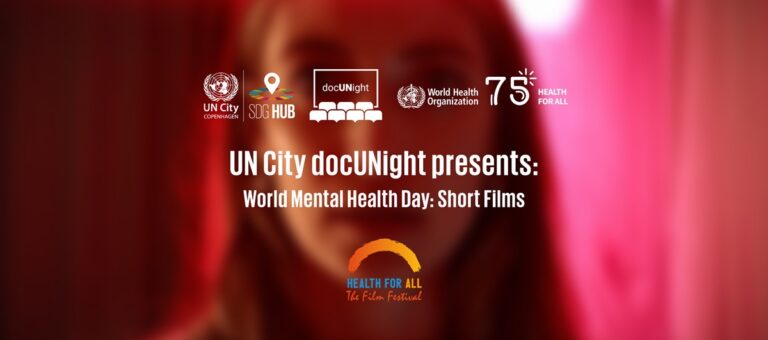In celebration of World Mental Health Day and the 75th anniversary of WHO, WHO and UN City Copenhagen are organizing a docUNight screening of award-winning short films on various topics related to mental health and well-being.
In the short films, we will meet ordinary people with extraordinary determination and resilience. Addressing topics such as depression, climate anxiety, schizophrenia, stigma or homelessness – combined with a strong message of hope – the films highlight the importance of connecting with each other, promoting discussion, dialogue and understanding.
The short films are among the shortlisted or winning films of the WHO Health for All Film Festival.
The screening is followed by discussions and Q&As, inspiring conversations, actions and solutions to reduce stigma and improve well-being for all through #Film4Health.
Panelists:
Paul Jerndal
Paul Jerndal is an award-winning Swedish filmmaker and vocal advocate for mental health. Paul actively engages with non-profit mental health organizations and initiatives, using his films to raise awareness and spark positive change, sparking conversations that promote understanding, compassion and introspection.
Rune Jorgensen
Rune Jørgensen is a volunteer ambassador for One Of Us, a Danish government campaign aimed at tackling the societal stigma associated with poor mental health. He also has 20 years of experience living with a mental health issue. Politically engaged, Rune sees his work as part of the fight against stigma and self-stigma in a broader context of society.
Dr Lédia Lazeri
Dr Ledia Lazeri is Regional Advisor for Mental Health at WHO/Europe, leading WHO’s work on mental health across several areas, such as policies and services, rights and advocacy, and implementing the WHO European Mental Health Action Framework 2021-2025 and supporting the Pan-European Mental Health Coalition.
Background
Mental health is important. However, people with mental health problems rarely receive the help they need. Many people avoid disclosing a mental health problem because it often leads to discrimination and stigma: they may lose their job or have difficulty getting hired, be disadvantaged in queues for housing, and even move away from their friends and family.
Mental health services are underfunded and underfunded: for the approximately 1 in 7 people in the WHO European Region who have a diagnosable mental health problem, governments do not allocate average only about 3.0% of their health budgets to mental health services. Furthermore, the Region only has around 45 mental health workers per 100,000 people.
WHO launched the Pan-European Mental Health Coalition in 2021 to bring together everyone who already embraces the phrase “mental health matters”, whether health professionals, academics or individuals living with mental health problems and their families. The overarching goal of the coalition is to create a space to share knowledge, wisdom and experience to improve mental health at individual, community, national and international levels.
The WHO film festival on health for all
The WHO Health for All Film Festival (HAFF) aims to mobilize a new generation of film and video innovators to champion global health issues, by inviting independent filmmakers, production companies, non-governmental organizations, communities, students and film schools around the world. to submit their original short films on health. In its fourth year, in 2023, European filmmakers have highlighted mental health. HAFF received hundreds of applications from around the world, competing in categories including universal health coverage, health emergencies, improving health and well-being, sexuality and well-being. Health and reproductive rights, Climate change and health and Very short film. Since 2020, the Health for All Film Festival has gathered more than 4,300 applications from 110 countries.
